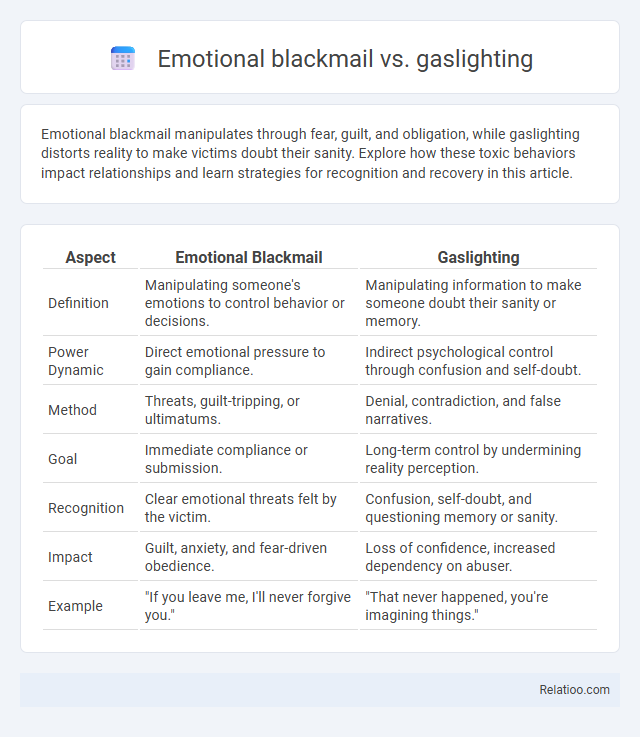Emotional blackmail manipulates through fear, guilt, and obligation, while gaslighting distorts reality to make victims doubt their sanity. Explore how these toxic behaviors impact relationships and learn strategies for recognition and recovery in this article.
Table of Comparison
| Aspect | Emotional Blackmail | Gaslighting |
|---|---|---|
| Definition | Manipulating someone's emotions to control behavior or decisions. | Manipulating information to make someone doubt their sanity or memory. |
| Power Dynamic | Direct emotional pressure to gain compliance. | Indirect psychological control through confusion and self-doubt. |
| Method | Threats, guilt-tripping, or ultimatums. | Denial, contradiction, and false narratives. |
| Goal | Immediate compliance or submission. | Long-term control by undermining reality perception. |
| Recognition | Clear emotional threats felt by the victim. | Confusion, self-doubt, and questioning memory or sanity. |
| Impact | Guilt, anxiety, and fear-driven obedience. | Loss of confidence, increased dependency on abuser. |
| Example | "If you leave me, I'll never forgive you." | "That never happened, you're imagining things." |
Understanding Emotional Blackmail: Definition and Core Tactics
Emotional blackmail involves manipulating someone by exploiting their fears, guilt, or sense of duty to control their actions, often using threats or ultimatums. Gaslighting, by contrast, distorts reality to make the victim doubt their perception, memory, or sanity, undermining their confidence and autonomy. Understanding emotional blackmail requires recognizing its core tactics, such as inducing anxiety, withholding affection, and leveraging personal vulnerabilities to coerce compliance.
What Is Gaslighting? Key Characteristics Explained
Gaslighting is a manipulative tactic where the abuser induces doubt in the victim's perception of reality, often making them question their memory or sanity. Key characteristics include persistent denial, misinformation, contradiction, and psychological manipulation to destabilize the victim's confidence. Unlike emotional blackmail, which leverages guilt and threats to control behavior, gaslighting targets the victim's sense of truth and mental stability.
Emotional Blackmail vs Gaslighting: Key Differences
Emotional blackmail manipulates fear, guilt, and obligation to control someone's behavior, using threats or punishment to enforce compliance. Gaslighting distorts reality, making the victim doubt their perceptions, memories, or sanity to gain power and control. The key difference lies in emotional blackmail directly demanding change through fear, whereas gaslighting subtly erodes a person's trust in their own mind.
Signs You’re Experiencing Emotional Blackmail
Signs you're experiencing emotional blackmail include feeling constant guilt or fear that your choices will cause someone to react negatively, consistent threats to withdraw affection or support, and manipulation tactics that pressure you into compliance. Unlike gaslighting, which distorts your perception of reality, emotional blackmail directly exploits your vulnerabilities to control your behavior. Recognizing patterns such as ultimatums, punishment threats, or persistent criticism is crucial to identifying emotional blackmail and protecting your mental well-being.
Common Gaslighting Techniques and Their Impact
Common gaslighting techniques include persistent denial, distortion of facts, and manipulation of memories, which erode victims' sense of reality and self-trust. Emotional blackmail involves threats or guilt-tripping to control behavior, while gaslighting systematically undermines mental stability and confidence through psychological manipulation. The impact often results in anxiety, confusion, and long-term trauma, highlighting the critical need for awareness and intervention in abusive relationships.
Psychological Effects: How Victims Are Affected
Victims of emotional blackmail often experience heightened anxiety, fear, and a pervasive sense of helplessness due to manipulation tactics that exploit their vulnerabilities and guilt. Gaslighting victims face confusion, self-doubt, and impaired reality perception as their abusers systematically distort facts to undermine their mental stability. Both forms of emotional abuse significantly damage self-esteem, trust in others, and can lead to long-term psychological issues such as depression and post-traumatic stress disorder (PTSD).
Why Manipulators Use Emotional Blackmail and Gaslighting
Manipulators use emotional blackmail to control and coerce others by exploiting fear, obligation, and guilt, creating an intense pressure that undermines the victim's autonomy. Gaslighting is employed to distort reality, causing victims to doubt their perceptions, memories, or sanity, thereby increasing dependency on the manipulator. Both tactics serve the manipulator's goal of maintaining power and dominance by destabilizing the victim's emotional and psychological stability.
Emotional Blackmail and Gaslighting in Relationships
Emotional blackmail in relationships involves using threats, guilt, or fear to manipulate a partner into compliance, often leaving the victim feeling trapped and powerless. Gaslighting is a form of psychological abuse where one partner distorts reality, making the other doubt their perceptions and memory, eroding self-confidence and trust. Both tactics undermine healthy communication, but emotional blackmail relies on direct coercion, while gaslighting subtly alters the victim's sense of truth and sanity.
Strategies for Recognizing and Responding to Manipulation
Recognizing emotional blackmail involves identifying threats or ultimatums used to control Your decisions, whereas gaslighting is characterized by deliberate distortion of reality to make You doubt Your perceptions. Responding effectively to manipulation requires setting clear boundaries, seeking external support, and documenting incidents to maintain clarity and confidence. Awareness of these distinct tactics empowers You to protect Your emotional well-being and regain control over toxic dynamics.
Healing and Recovery: Moving Beyond Manipulation
Healing and recovery from emotional blackmail, gaslighting, and manipulation require recognizing patterns of control and reclaiming your personal power. Establishing clear boundaries and seeking therapy or support groups can facilitate processing trauma and rebuilding self-esteem. Your journey beyond manipulation involves consistent self-awareness and nurturing healthy relationships that promote trust and emotional safety.

Infographic: Emotional blackmail vs Gaslighting
 relatioo.com
relatioo.com